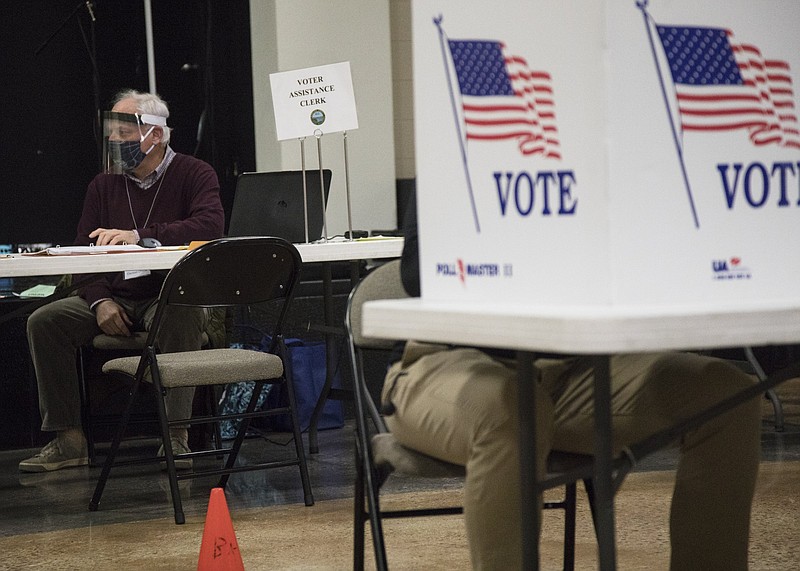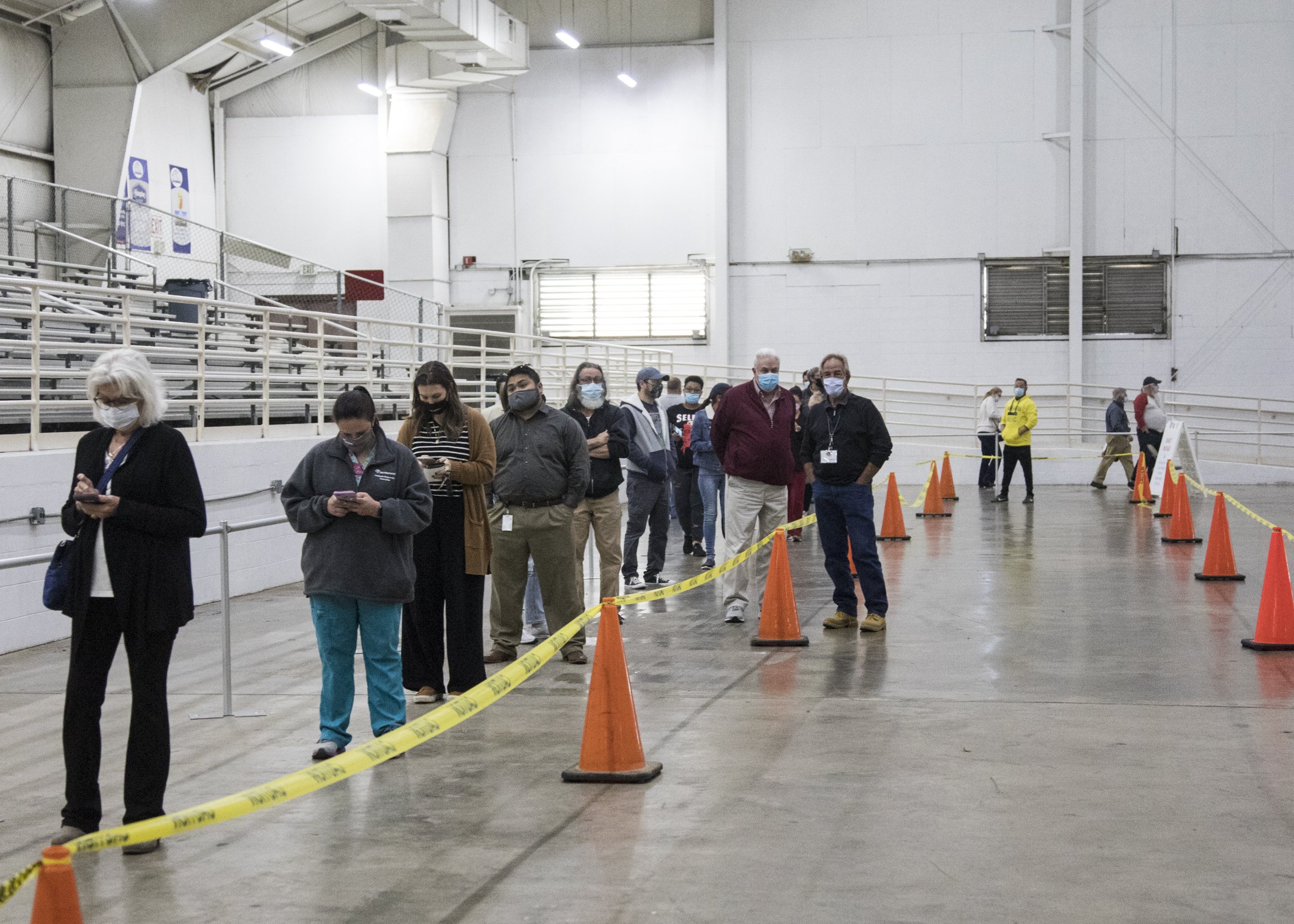In the past year, Chattanooga has been hit with a pandemic, tornadoes and the worst economic slowdown since the Great Depression nearly a century ago.
But as voters went to the polls this month to pick their leaders for the future, most Chattanoogans surveyed by the Times Free Press said they remain optimistic about the direction of Hamilton County, even if they are more unsure about the country as a whole.
Less than a third of voters surveyed at the polls during early voting and on Election Day said the United States as a whole is headed in the right direction and nearly half said the country is going in the wrong direction. Nearly 15% of respondents said they were unsure, and many said the outcome of the election could determine the future direction for the U.S.
But when asked about their hometown, most voters were decidedly more positive. Even though the pandemic has upended many traditional gatherings and displaced thousands of local workers from their jobs this year, nearly two-thirds of local voters said they think Hamilton County is headed in the right direction. Fewer than 1 in 6 voters said the Chattanooga area was going in the wrong direction.
"That's been the sentiment that I have seen for some time," Chattanooga Mayor Andy Berke said. "People are extremely bullish on Chattanooga and what has been accomplished here."
Indeed in a similar voter survey conducted by the Times Free Press in 2016, nearly 69% of the respondents said Chattanooga was then headed in the right direction, compared with only 16.4% who said it was going in the wrong direction.
ECONOMIC OUTLOOK
Prior to the COVID-19 virus sickening the economy, Chattanooga's jobless rate dropped to an all-time low of just over 3% at the start of this year, down from about 5% four years earlier and a 10% unemployment rate a decade earlier.
Unemployment in Hamilton County jumped to a record high of 14.4% in April as restaurants, stores and other businesses shut down to limit the spread of the coronavirus. But the jobless rate has dropped every month since as the economy has reopened and people have tried to adjust to the pandemic, helping to lower unemployment to 5.6% in September across Hamilton County.
How the survey was conducted
The survey results are based upon responses from 267 voters from across Hamilton County who were interviewed by staffers from the Times Free Press during early voting and on election day, Nov. 3, at the polls. Voters were sampled during early voting at all four voting sites in the county and on election day at 18 voting precincts selected to represent the county as a whole.
"I think the size of our city and the diversity of our economy has helped us this year and we remain a place that a lot of people want to come to visit or live," said Christy Gilllenwater, president of the Chattanooga Area Chamber of Commerce, which has sought to recruit both businesses and workers to Chattanooga in 2020.
Nearly half of voters surveyed by the Times Free Press expect their personal financial situation will improve in 2021, compared with only 6.4% who said they think it will worsen.
"It's been a tough year for many people, but getting people back to work and being able to go out and shop or visit a restaurant again has certainly helped and our sales taxes are now up so people are spending money again," Hamilton County Mayor Jim Coppinger said. "Our unemployment rate has remained below the national average, and I think at the local level, people are willing to work together and get things done, regardless of their party differences."
NATIONAL DIVISIONS
In the national elections, there was neither a blue nor a red wave this year, and it appears Washington will again have divided government, at least between Democratic President-elect Joe Biden and the likely GOP-controlled or evenly divided U.S. Senate, depending upon the results of two Senate runoff elections in Georgia.
That appears to be pleasing to Wall Street. The election outcome and the prospects of a vaccine for the coronavirus pushed the stock market to an all-time high this past week.
"Wall Street doesn't necessarily reflect the will of all people, but it does seem to signal that it likes the outcome of this election, and the fact that we're all going to have to work together across party lines to get things done is probably a good thing," said Tom Ingram, a Republican political consultant who runs the Ingram Group in Nashville.
Voter sentiments on the direction of the country were often shaped this year by an especially divisive presidential election in which many voters saw the United States through an electoral lens, according to Dr. Kent Syler, professor of political science at Middle Tennessee State University.
"We've become so polarized that the party out of power thinks everything is on the wrong track until their party wins and then they think everything is going in the right direction," he said.
Traditionally, Syler said such a high level of voter sentiment that the country is going in the wrong direction is bad for incumbents. But a majority of Tennessee voters, including those in Hamilton County, generally voted to re-elect President Donald Trump and most of the other incumbents up and down the ballot.
But with Trump in the White House and Democrats in control of the U.S. House, plenty of voters may have found reasons to be unhappy, especially when they were bombarded with attack advertisements or commentary on social media, cable TV and broadcast TV and radio commercials.
"Overall, we've seen very high rates of people saying the country is going in the wrong direction in recent years, and that's not a good number," Syler said. "It reflects the fact that so many of our institutions have been under attack."
RACIAL DIFFERENCES
Racial tensions and disparities were also highlighted during 2020 with protests in many cities, including Chattanooga, following the May 25 death of George Floyd at the hands of the Minneapolis police.
Many voters may have seen images of cities elsewhere in the country where there were more protests or even rioting "and people figured their community must be better because it's not on fire," Syler said.
Black voters were much more pessimistic about the direction of the country than were white voters who were sampled by the Times Free Press. Nearly 71% of African American voters said they thought the country was going in the wrong direction, compared with fewer than 40% of whites who said the U.S. was going in the wrong direction.
On the local level, both Black and white voters were more optimistic, with 57% of Black voters and nearly 69% of white voters saying they think Hamilton County is going in the right direction.
In Hamilton County, political leaders say the partisan differences are less pronounced. City elected officials in the area are not elected by political parties and, even where partisan differences exist, they are less pronounced.
Coppinger, the Republican mayor of Hamilton County, and Berke, the Democratic mayor of Chattanooga, regularly meet and work together and each called their relationship with the other strong and productive.
"I'm really hoping that as we move past the elections that people will come together for the betterment of the community," Coppinger said. "We've done it before and we'll do it again."
Contact Dave Flessner at dflessner@timesfreepress.com or at 423-757-6340.

